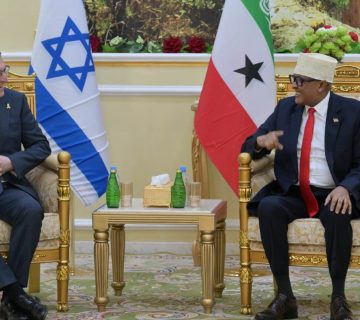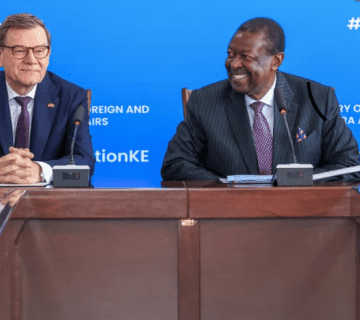To date, Egypt has prevented the construction of any major infrastructure projects on the Nile River by leveraging a combination of colonial-era treaties that favor Egypt over the other riparian states, diplomatic pressure, and thinly-veiled threats of military force. This historically effective combination, however, has failed to prevent the ongoing construction and filling of the Grand Ethiopian Renaissance Dam (GERD). Nevertheless, Egypt continues to apply this flawed strategy to isolate Ethiopia within the region and the international community to force it into compliance. Egypt enjoys a comparative position of economic and political strength, especially given the current crisis within Ethiopia. It is understandable that the country, which depends on access to the Nile’s freshwater, would take advantage of Ethiopia’s domestic crisis to pursue its strategic interests. However, backing an already strained Ethiopia into a corner of Egypt is raising the risk of the country lashing out, with potentially severe consequences for the region.
The Grand Ethiopian Renaissance Dam (GERD) is the largest hydroelectric power plant in Africa. The reservoir feeding the dam will take four to seven years to complete, with the first filling taking place in late July 2020 and the second scheduled for August 2021. The project is being paid for largely by domestic crowdfunding. Egypt believes that the GERD poses a national security threat given its ability to restrict the water supply from the Nile, the country’s main source of fresh water. It insists that a set of colonial-era treaties, which remain unrecognized by the other riparian states except for Sudan, are valid and entitle it to 55.5 billion cubic meters of water from the Nile annually.
Internationally, Egypt has largely succeeded in its effort to isolate Ethiopia diplomatically (even before the current Tigray crisis). Under the Trump administration, Egypt leveraged the US’ interest in securing a rapprochement between Israel and Arab nations to secure favorable mediation. The US suspended $272 million in aid to Ethiopia because of its supposed intransigence in US-brokered negotiations. Egypt also obtained a resolution from the Arab League backing its claims to the Nile’s water. Egypt’s diplomatic efforts have, allegedly, contributed significantly to the lack of international financing for the GERD. Egypt asserts that the international community recognizes the controversy surrounding the GERD and “doesn’t want to get involved.” Ethiopia says that it does not require external assistance to complete the dam.
Within the region, Egypt’s efforts to isolate Ethiopia have met with some success. High-level Egyptian officials have reached out to countries in the Horn to push for their support in the GERD dispute. Kenya, Somalia, and Djibouti all say that they will remain neutral. However, Egypt has secured military cooperation agreements with Burundi, Uganda, and Sudan amidst the ongoing tensions with Ethiopia. Egypt’s greatest regional success is what Ayan Aman of Al-Monitor terms “Egyptian-Sudanese convergence.” The two countries have set aside historical sources of tension to focus on confronting Ethiopia. In addition to a joint diplomatic campaign, the two countries have reached an unprecedented level of military cooperation. In late May 2021, the two nations held joint military exercises. The exercise, according to Sudanese officials, “had nothing to do with the GERD.” However, the operation’s name, ‘Guardians of the Nile,’ and its timing seem to contradict this assertion.
The Egyptian strategy has failed to accomplish its objective: preventing the continued construction and filling of the GERD until a favorable agreement is secured. Instead, it further agitates the country which is already experiencing substantial domestic unrest. The military agreements with and diplomatic pressure on Ethiopia’s neighbors, coupled with attempts to cut off economic support from the international community, are forcing Ethiopia into a corner. A growing feeling of isolation and encirclement among Ethiopian leaders is counterproductive for Egypt. Instead of forcing Ethiopia to the negotiating table, the Egyptian strategy is causing Ethiopia to further dig in its heels. Failure to change course soon may drive Ethiopia to lash out as the severity of the perceived threat from Egypt’s efforts increases.
Although initial attempts at an African Union-led resolution failed, it is in the best interests of peace and security in the region for Egypt to step away from efforts to secure favorable mediation from bilateral actors like the US and instead work through multilateral organizations. Ethiopia hosts the African Union, so it is understandable that Egypt would be hesitant to work within an AU-led resolution process. A potential compromise may be to carve out a greater role for the United Nations to work alongside the AU to resolve the GERD dispute.
Joseph Hartung is a Researcher at the HORN Institute.
Photo: A trilateral meeting was held this morning at the Office of the Prime Minister between Prime Minister Abiy Ahmed, President Abdel Fattah el-Sisi of Egypt and President Omar al-Bashir of Sudan (Photo Credit: AFP/Horn Diplomat)
The contents of this article are copyright of © The HORN Institute 2022. All rights reserved. Any redistribution or reproduction of part or all of the contents in any form and for whatever reason is prohibited. You may use the content of this article for personal reasons, but acknowledge the website as the source of the material.



